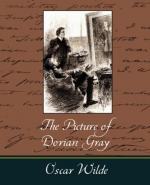Dorian Gray drew a long breath. The color came back to his cheeks, and a smile played about his lips. The peril was over. He was safe for the time. Yet he could not help feeling infinite pity for the young man who had just made this strange confession to him. He wondered if he would ever be so dominated by the personality of a friend. Lord Harry had the charm of being very dangerous. But that was all. He was too clever and too cynical to be really fond of. Would there ever be some one who would fill him with a strange idolatry? Was that one of the things that life had in store?
“It is extraordinary to me, Dorian,” said Hallward, “that you should have seen this in the picture. Did you really see it?”
“Of course I did.”
“Well, you don’t mind my looking at it now?”
Dorian shook his head. “You must not ask me that, Basil. I could not possibly let you stand in front of that picture.”
“You will some day, surely?”
[58] “Never.”
“Well, perhaps you are right. And now good-by, Dorian. You have been the one person in my life of whom I have been really fond. I don’t suppose I shall often see you again. You don’t know what it cost me to tell you all that I have told you.”
“My dear Basil,” cried Dorian, “what have you told me? Simply that you felt that you liked me too much. That is not even a compliment.”
“It was not intended as a compliment. It was a confession.”
“A very disappointing one.”
“Why, what did you expect, Dorian? You didn’t see anything else in the picture, did you? There was nothing else to see?”
“No: there was nothing else to see. Why do you ask? But you mustn’t talk about not meeting me again, or anything of that kind. You and I are friends, Basil, and we must always remain so.”
“You have got Harry,” said Hallward, sadly.
“Oh, Harry!” cried the lad, with a ripple of laughter. “Harry spends his days in saying what is incredible, and his evenings in doing what is improbable. Just the sort of life I would like to lead. But still I don’t think I would go to Harry if I was in trouble. I would sooner go to you, Basil.”
“But you won’t sit to me again?”
“Impossible!”
“You spoil my life as an artist by refusing, Dorian. No man comes across two ideal things. Few come across one.”
“I can’t explain it to you, Basil, but I must never sit to you again. I will come and have tea with you. That will be just as pleasant.”
“Pleasanter for you, I am afraid,” murmured Hallward, regretfully. “And now good-by. I am sorry you won’t let me look at the picture once again. But that can’t be helped. I quite understand what you feel about it.”
As he left the room, Dorian Gray smiled to himself. Poor Basil! how little he knew of the true reason! And how strange it was that, instead of having been forced to reveal his own secret, he had succeeded, almost by chance, in wresting a secret from his friend! How much that strange confession explained to him! Basil’s absurd fits of jealousy, his wild devotion, his extravagant panegyrics, his curious reticences,—he understood them all now, and he felt sorry. There was something tragic in a friendship so colored by romance.




